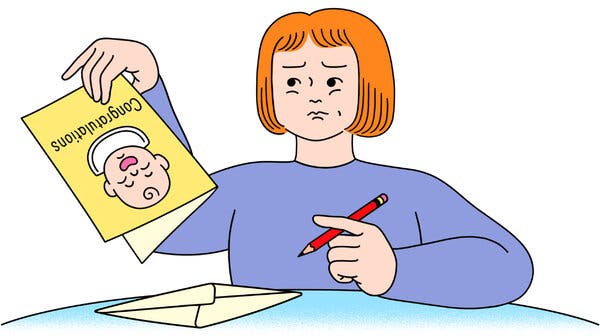The Ethicist
The magazine’s Ethicist columnist on the etiquette associated with offering congratulations.

I have an aunt with whom I’ve always had a warm relationship. She has an adult son whom I am not close to and who seems to have many struggles. Over the past few years, this son has been in relationships that have resulted in multiple pregnancies. My aunt is always excited about these pregnancies and seems to expect congratulations — even though, by her own admission, she does not trust her son to be alone with his own child. Now that my cousin is expecting another baby, I feel bad not to have reached out with congratulations or even support. But I also feel it would be disingenuous to do so. It doesn’t seem like my place to express my concern. What seems appropriate? — Name Withheld
From the Ethicist:
When people you love get something they value, it seems apt to congratulate them, regardless of how you view the situation. I would congratulate a friend who won tchotchkes she wanted in a raffle, even if I thought she already had enough of them and even if I’d junk them myself. But if I believed that the situation posed genuine harm for someone — if an alcoholic friend, only tenuously sober, won a case of cognac — I would convey my concerns along with my congratulations.
How does this apply to the human context of an expanding family? Something can be good for one person — as, in this case, having a grandchild is good for your aunt — and bad for others. The welfare of the child, of course, has to be considered first. You leave us to guess about the mother, but when you say that your aunt doesn’t trust her son to be alone with his child, is the thought that he’s too irresponsible to be a caregiver? Or that he poses an actual threat? I suppose you would have indicated if you thought he was a monster. But short of that, we’re still left to wonder whether he’s basically useless (e.g., prone to nodding off, or wandering off, when he should be minding the child) or whether he could actively be making someone in his charge unsafe (as with the reeling drunk who insists on playing ‘‘airplane’’ with baby).
Because you care about your aunt and, presumably, her grandchild, you have to raise with her the issue of what she can do to keep the child from harm, whether from neglect or worse — which, in turn, may well involve her taking up the issue, carefully, with the mother (and the mother of the unborn grandchild, once the baby arrives). Unless that’s a discussion you’ve already had? Plainly, nothing you say will stop her troubled son from fathering children. But you don’t have to rebuff a grandmother’s excitement at having grandkids to encourage her vigilance in protecting them.
Readers Respond
The previous question was from a reader in a financial-planning quagmire. He wrote: “In a recent visit, my parents, both in their 70s, outlined their intentions for their considerable assets, which include a trust worth millions of dollars. They propose that my brother and I (both in our 30s) serve as trustees. We would receive an unconditional portion of the trust, with access to a majority share with conditions. My parents intend the trust to benefit ‘future generations,’ in short, potential grandchildren. If there are no grandchildren (there are none currently; we’ve never discussed this topic), the trust is to be allocated for charitable purposes, particularly to support disadvantaged regional children, with my brother and me overseeing the disbursements. This proposal has raised several ethical concerns for me. … First, my parents’ wishes heavily favor individuals who may never come into existence. … Second, I worry about the potential for moral hazard. My brother and I, along with our partners, now have a financial incentive to bring a child into the world for our own monetary gain. … Finally, I am grappling with the idea of serving as a trustee for a trust that espouses values not entirely aligned with my own. … While I understand that I should continue the dialogue with my parents, how do I manage these ethical issues?”
In his response, the Ethicist noted: “If you think it’s better that you don’t have children, you needn’t change course just because there is money available for their support if you do. … In the end, though, you’re raising the question of whether your parents’ financial arrangements risk your doing something you wouldn’t do otherwise. The fact that you’re unsure you can handle this risk suggests that your parents might have reasons for proceeding as they propose to and not designating you and your brother the direct beneficiaries of this trust. They may agree that the two of you are thriving and perhaps worry that too much money too soon would interfere with your making your own way in the world. And if there are no grandchildren to support, the decision to help disadvantaged children sounds like a perfectly decent one. … Assuming some base line of benevolence, why must your parents’ charitable priorities be entirely aligned with yours? If it were your money, you might spend it on, say, malaria prevention or nature conservation instead. But it isn’t your money.” (Reread the full question and answer here.)
⬥
The Ethicist is correct. The parents have the right to do whatever they want to do with their own money. If the letter writer and his brother have an issue for whatever reason, then they should contest the will at their own cost. The situation described in this letter almost makes me want to give my money away while I am alive, so these shenanigans cannot occur in my own family. — Lisa
⬥
I think the letter writer’s concern about the terms of the trust influencing future behavior is legitimate. It’s not uncommon for people’s views on having children to change over the years; I don’t think it’s very helpful to have this type of incentive added to the deliberation of a decision that for some can be filled with uncertainty. Perhaps the letter writer and his brother could make a counterproposal to their parents, asking them to divide the larger share of the trust equally between the two of them and to designate a smaller unconditional portion of their bequest to charities they select. — Tom
⬥
I agree with almost everything the Ethicist has written about the trust, but I think the letter writer has missed his parents’ intention. As someone who recently updated his will, I can tell you that my lawyer’s main concern was to avoid probate and minimize estate taxes. There can be ethical questions about using legal tax loopholes for inherited wealth, but I suspect that the parents are just making sure that first their children, and then their grandchildren, get the maximum inheritance. I would guess that the ethical concerns of the letter writer were far from the minds of his parents. — Richard
⬥
My husband and I are in our 70s with a significant trust and a married daughter in her mid-30s with no children thus far. I get where the parents are coming from. The Ethicist was incredibly polite and made it clear that the parents’ money is up for discussion, not their sons’. (A cynical reading of the letter is that one or both sons would prefer an unrestricted trust.) Many people are successful due — at least in part — to an upbringing that includes caring parents, a fully funded education and other advantages. The letter writer and his brother may well be in this group, and they may benefit from reading “Second Class,” by Batya Ungar-Sargon. Maybe the parents’ choices about how their assets are disbursed after death has nothing to do with encouraging their sons to have children; perhaps they simply wish to extend the advantages their sons enjoyed to as many children as possible — within the family or outside of it. — Mary Ann
⬥
As a trust and estates attorney, I agree with the Ethicist. The principal point here is that the parents have every right to design their trust exactly as they wish. It’s their money. If one or both of their sons experience any distress, they are each free to decline to serve as trustee and to disclaim any or all of their shares. I suggest continuing the conversations if the parents are amenable. But for the process to work, everyone has to be honest with one another and themselves. — Sandy
Kwame Anthony Appiah is The New York Times Magazine’s Ethicist columnist and teaches philosophy at N.Y.U. His books include “Cosmopolitanism,” “The Honor Code” and “The Lies That Bind: Rethinking Identity.” To submit a query: Send an email to [email protected]. More about Kwame Anthony Appiah
The Ethicist’s Answers to Your Moral Quandaries
Kwame Anthony Appiah helps readers handle life’s trickiest situations.
A trust would give me big bucks if I had children. What are the ethical issues, and are there unforeseen risks?
My aunt’s son shouldn’t be a dad. Must I congratulate her on the new grandkid?
I wrote a novel that drew on an episode that involved an adulterous friend. Was I wrong to reveal what inspired the plot?
I’ve been giving a good friend unsolicited monetary gifts for years. Is it controlling and demeaning to give him money with strings attached?
To submit a question to the Ethicist, send an email to [email protected].
Advertisement
